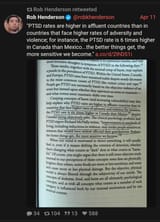Anonymous
ID: d1Kku/PE
7/9/2025, 6:02:32 AM No.509892046
>Within the United States, Canada, and Europe, PTSD rates have remained stable despite steady decreases in the most common causes of PTSD like violent crime and rape.22 People get PTSD not necessarily based on the objective violence of an event but instead upon whether they experience an event as traumatic-and what events seem traumatic shifts over time.
>Creeping concepts of harm (and increasing vulnerability) may also help explain why PTSD rates are higher in affluent countries than in countries that face higher rates of adversity and violence; for instance, the PTSD rate is six times higher in Canada than Mexico, despite Canada's being objectively safer. The clinical psychology professor and PTSD expert Richard McNally writes, "Improvements in standards of living, including reductions in violence, may render people sensitive to stressors that would have seldom affected their grandparents. Perhaps the better things get, the more sensitive we become." 24
>When our mind is motivated to detect something, it will usually find it, even if it means shifting the criterion of detection, whether that's changing what counts as "dark" dots or what counts as "harm-ful." Of course, you might argue that there is still some objective truth external to our perceptions of these concepts: some dots are physically brighter than others, some foods are more or less nutritious, and some acts cause more or less physical damage. But the objective, physical world is always filtered through the subjectivity of our minds. The concepts of darkness, food, and harm are all ultimately psychological concepts, and as with all concepts what counts as a member of each category is influenced both by our internal motivations and by our external context.
>Creeping concepts of harm (and increasing vulnerability) may also help explain why PTSD rates are higher in affluent countries than in countries that face higher rates of adversity and violence; for instance, the PTSD rate is six times higher in Canada than Mexico, despite Canada's being objectively safer. The clinical psychology professor and PTSD expert Richard McNally writes, "Improvements in standards of living, including reductions in violence, may render people sensitive to stressors that would have seldom affected their grandparents. Perhaps the better things get, the more sensitive we become." 24
>When our mind is motivated to detect something, it will usually find it, even if it means shifting the criterion of detection, whether that's changing what counts as "dark" dots or what counts as "harm-ful." Of course, you might argue that there is still some objective truth external to our perceptions of these concepts: some dots are physically brighter than others, some foods are more or less nutritious, and some acts cause more or less physical damage. But the objective, physical world is always filtered through the subjectivity of our minds. The concepts of darkness, food, and harm are all ultimately psychological concepts, and as with all concepts what counts as a member of each category is influenced both by our internal motivations and by our external context.
Replies:














